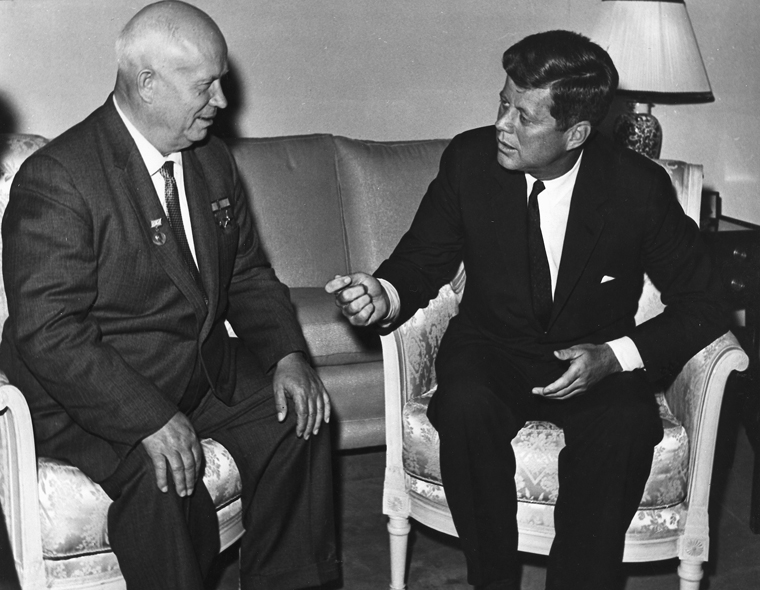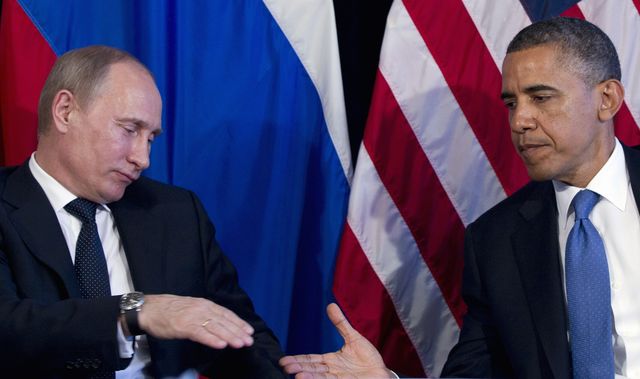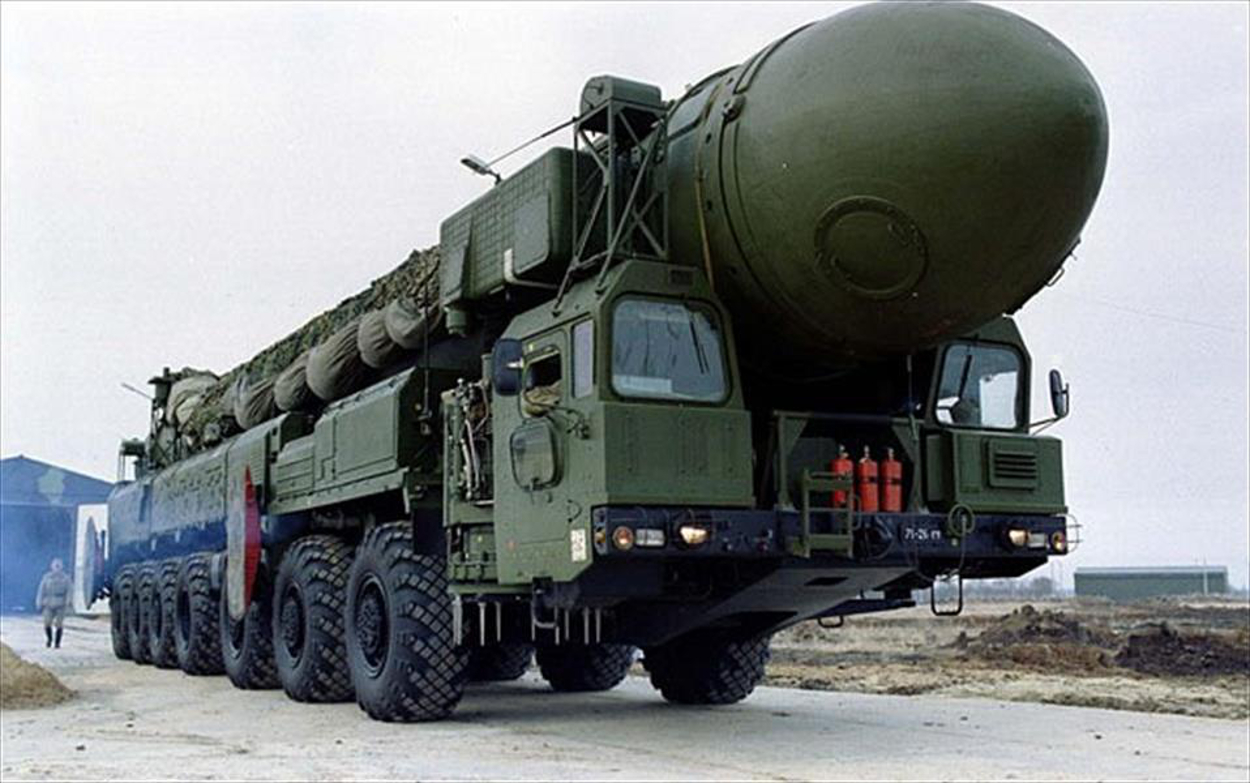Menes Tau
Nefetiti
Akosua Abeka[/td_text_with_title][td_block10 category_id=”34″ limit=”5″]
Tensions have been festering and brewing between the two biggest nuclear powers, the USA and Russia, over compliance with a number of arms control treaties that for decades have been vital to keeping the peace and setting an example for other nuclear nations.
The Ukraine debacle by the USA and the annexation of the Crimea by Russia has driven a wedge between Washington and Moscow. The U.S. has accused Russia of violating at least five agreements but as it continues to absolve itself from any such blame, Russia has fired back.
A failure to resolve the impasse could have extremely dangerous consequences for the post-Cold War order, since even 20 years after the fall of the Soviet Union, the two sides together possess more than 10,000 nuclear weapons for absolutely no war-mongering reason, more than 90 percent of what exists in the world.

The most serious dispute centers on the 1987 Intermediate-range Nuclear Forces Treaty, which bans both sides from deploying ground-launched ballistic and cruise missiles with a range of between 300 and 3,400 miles that carry nuclear or conventional warheads.
Under the treaty, signed by President Ronald Reagan and the Soviet leader, Mikhail Gorbachev, America destroyed 846 missiles and the Soviets, 1,846 missiles. Both sides had come to see the systems as unacceptably risky to their own forces, and perhaps the world.
The pact prohibited the production and flight testing of new I.N.F. systems as well. But Washington accused Russia for testing a new cruise missile as early as 2008. The Obama administration raised the matter with the Russians in May 2013, and in July 2014 it formally alleged that the test violated the treaty.
On one hand the allegation may be founded, but on the other hand, the parochial mention is disingenuous. The U.S. has also been actively utilizing cruise missile inventory since military adventures dating back to President Reagan’s attack on Libya in 1986.
This was followed by several cruise missile deployments in the First Gulf War, the Yugoslavian Campaign, the war in Afghanistan, the Second Gulf War, and attacks in Pakistan, along with close collaboration with Israel in the use of cruise missiles against various Arab states in the past 20 years.
The technicality that the U.S. hangs unto in explaining away its uses is not helping the cause for peace, at best, it is a foolhardy one. The cruise missiles, the U.S. will contend, were not used in a ‘testing environment’. As such by legal implication of the treaty, real time usage on an actual battlefield involving both military and civilian causalities do not constitute an abrogation. This explanation is duplicitous.
A resolution to these misunderstandings is further complicated by continued hostility over President Vladimir Putin’s annexation of the Crimea and concerns that Mr. Putin, may be determined to reconstitute the Soviet Union, and may be eager to face down the West.
Russia has not acted in a vacuum neither. It has seen NATO’s presence on its borders as a threat, while the Americans say Russia has failed to comply fully with at least four other treaties, including those requiring the destruction of biological and chemical arms.
Mr. Putin is not unique. Russia might like a Czar. And perhaps, Mr. Putin, is the one. He may not rule democratically, but he has the loyalty of his people and he is in a position to demand and receive sacrifices.
The prejudice against Russia shown by U.S. media giants like the New York Times does more to inflame hostilities between the two nations than a true exercise in journalism. The ideas supported by major media outlets in the U.S. seem to be that the United States can repeatedly attack Russian interests and there can be no response from Russia because any response will mean more attacks.
This attitude condoned in the West continues to fester discontentment in the rest of the world; where NATO painfully strokes Russian emotions with missiles, there is no problem, unless of course Russia reacts, and then Russia must be further punished for reacting.
This insolence must stop if an amicable solution ought to be found. Pragmatic steps must be taken to safeguard and assure the Russians and Western Europeans their territorial integrity – if this is what the Americans truly want.
First, Russia is surrounded by states that are outside of that Treaty, and deploying many such cruise missiles. North Korea, China, India, Pakistan, Iran and Israel, a staunch U.S. ally, by the way. Russia has a real problem, and the U.S. does not have the same problem. That should be obvious to any fair-minded diplomacy.
Russia may resent the fact that Israel, China, India and Pakistan are building their missile arsenals without treaty constraints and it may be only practical that Russia becomes more attached to its nuclear power as its conventional forces have deteriorated.
The solution is straightforward. Expand the Treaty to include all these nations, Israel too, and allow some balancing. That was done with the Naval Disarmament Treaties in the 1920’s and 30’s, where all nations were limited, but not all limits were exactly the same and accommodate some buffer zones. That strategy could again remain the answer here.
Second, the Russians are still deeply offended by the U.S. unilaterally abandoning an arms control treaty – the U.S. is pushing exactly those previously-banned weapons right up to the Russian border. The U.S. may claim that it has some concerns about Iran and North Korea, but they do it in ways that the Russians correctly – or have to – see as threatening.
The U.S. cannot continue to walk away whenever it feels circumstances are no longer in its favor, then expect that Russia would not walk away from others when circumstances change around them.
Mr. Putin has cited this concern as an independent reason to walk out of a treaty the U.S. wants. The U.S. walked out of what Russia wanted to keep, and so Putin walks out of one Mr. Obama wanted to keep. That is how diplomacy works; always has been; a tit-for-tat.
Despite the dispute, it would be a huge mistake for the United States to withdraw from the I.N.F. treaty, as some congressmen there have demanded. That would remove all restraints on Russia and seriously weaken a system of treaties that has been remarkably effective over decades at curbing the spread of destructive weapons.
It would also be a mistake for either side to reintroduce the banned weapons onto their own territory or elsewhere. Russia’s foreign minister, Sergey Lavrov, recently asserted Moscow’s right to put nuclear missiles in Crimea, while Brian McKeon, a senior Pentagon official, told the U.S. Congress last month that one response to Russia’s treaty violation could be to deploy American ground missiles in Europe.
Such new deployments would reverse a trend in which the two countries have substantially reduced their huge arsenals in recent years.

Both Mr. Putin and Mr. Obama are intelligent individuals, more capable than the hordes of lawmakers they lead, and time seems to show that they must begin to wear the pants in their respective relationships with their nations, or the world goes up in flames.
The Obama administration should continue pursuing a diplomatic solution to the treaty dispute and resist the growing pressure in its Congress for quick retaliation, which could make the situation worse.
So far, there is no evidence that Russia has deployed any new missiles, which would be a serious escalation. The United States and its allies should make agreements with Russia and both should immediately become compliant with the treaty. That would mean resisting the temptation to point the finger in Mr. Putin’s direction.
A piece of history should remind us all of what nuclear war means.
Hiroshima was hit with 15 Kilotons of nuclear fuel for absolutely no war wining reason. Japan had fallen by the summer of 1945 anyway. A single modern 1 Megaton of thermonuclear bomb today is fifty times the sum that vaporized away both Hiroshima and Nagasaki. And a whole lot more than all the explosions in WWll put together.
Let us imagine a train carrying the equivalent of such a bomb in tons of TNT. It would be loaded with 1,000,000 tons. It would be 300 miles long, and if it were traveling at 50 mph, it would take 6 hours to pass.
We are all marks in the shell game of These Bastards of War (TBWs) – The Mad Men that they are!
Radiation is still bleeding with no end in sight from Fukushima up to Alaska and it is on its way down to Chile. We must stop the madness. Or we may just have to save the West and Russia from themselves the way we know how – call them out, denounce them even, for the barbaric civilizations that they are.
All nuclear weapons must be destroyed and banned. Forever. Why?
Ma’at demands it.













“Or we may just have to save the West and Russia from themselves the way we know how – call them out, denounce them even, for the barbaric civilizations that they are.”
These are the biggest bullies the world has ever known. How no nation, no leader, no civilization in the world today can stand up and denounce this callousness is what beats me. There used to be truth-tellers in the world, once upon a time, but it seems in the 21st century, telling the truth is no longer fashionable. So thanks for telling it how it is. I appreciate it.
Two nations can destroy the world a thousand times over yet we sit like there’s nothing wrong going on. The UN is the most toothless organization there’s ever been. Their sheer lack of responsibility and out-rightness is damning.
The UN was always on the side of the big boys. The Un is constituted by the big boy. The UN is not democratic! The UN is not for hearing the voices of the people who want to live in a peaceful world. The UN is for war mongers.
So how can we make the UN a more democratic organization? You think it is possible? For me, I think it is possible to make it democratic. I would like to see that. I would like to see heads of state vote on issues of concern at the UN. Scrap the security council and the permanent seats that some countries have on it. Let us grow us really.
I think the UN can become democratic. It starts by telling the US and Russia to fuck off.
Thanks for making sure that the U.S. was not entirely blamed nor Russia, but it seems the U.S. has won the title of the “Bully of Bullies”. They go around causing trouble everywhere. It’s a big fat shame that a nation with such resources cannot foster peace in the world. but who are we kidding? That is who they are – trouble causers!
It seems to me that when it comes to the US and Russia, the only way they know how to solving problems is war – just war. I thought these childishness was outgrown.
Petulant kids. These nations keep spending whole sums of money developing and deploying weapons of mass destruction. We want to fight for a better world? My dear environmentalists, this is the single most important environmental problem in the world. The single most important one.
Wa ka anokre! Speak on people. Let us stop looking up to these nations. Let us make them irrelevant. Let us make them feel that nobody cares about who they are, where they are from, what they have and what they have to say. Let us make them feel like the kids that they are. Jesus!
The U.S. has a one size fits all approach for every situation. The conflict with Russia is much like the white conflict with black Americans. First white Americans, namely the white police, start a violent fight. Next, white Americans badmouth black Americans if they protest or retaliate. This approach will engender nothing but hate and resentment. The world does not want to see another Cold War, but this approach seems to invite nothing less.
Ma’at may demand the destruction of all nuclear weapons but where are the African leaders who will support this cause? Unless African leaders are willing to advocate for their people and not filling their pockets with Western money, they will not be able to enforce laws that will protect African citizens.
Yes you hit the message right here: we should all be concerned about limiting the production of nuclear weapons because we are all in the shell game. We can all be collateral damage. Doesn’t that concern anyone?